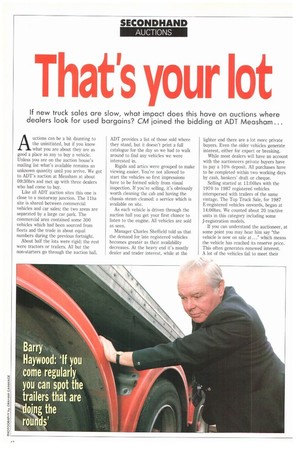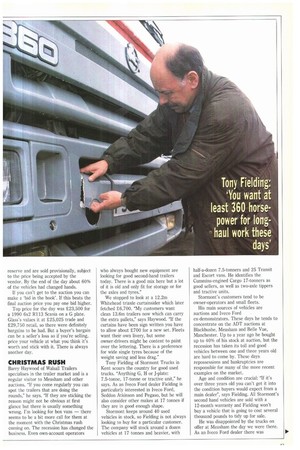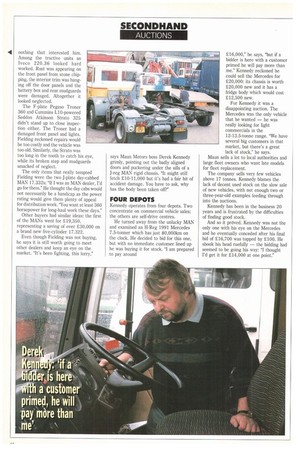That your lot
Page 44

Page 45

Page 46

If you've noticed an error in this article please click here to report it so we can fix it.
If new truck sales are slow, what impact does this have on auctions where dealers look for used bargains? CM joined the bidding at ADT Measham Auctions can be a bit daunting to the uninitiated, but if you know what you are about they are as good a place as any to buy a vehicle. Unless you are on the auction house's mailing list what's available remains an unknown quantity until you arrive. We got to ADT's auction at Measham at about 09:30hrs and met up with three dealers who had come to buy.
Like all ADT auction sites this one is close to a motorway junction. The llha site is shared between commercial vehicles and car sales; the two areas are separated by a large car park. The commercial area contained some 300 vehicles which had been sourced from fleets and the trade in about equal numbers during the previous fortnight.
About half the lots were rigid; the rest were tractors or trailers. All but the non-starters go through the auction hall. ADT provides a list of those sold where they stand, but it doesn't print a full catalogue for the day so we had to walk around to find any vehicles we were interested in.
Rigids and artics were grouped to make viewing easier. You're not allowed to start the vehicles so first impressions have to be formed solely from visual inspection. If you're selling, it's obviously worth cleaning the cab and having the chassis steam cleaned: a service which is available on site.
As each vehicle is driven through the auction hall you get your first chance to listen to the engine. All vehicles are sold as seen.
Manager Charles Sheffield told us that the demand for late registered vehicles becomes greater as their availability decreases. At the heavy end it's mostly dealer and trader interest, while at the
lighter end there are a lot more private buyers. Even the older vehicles generate interest, either for export or breaking.
While most dealers will have an account with the auctioneers private buyers have to pay a 10% deposit. All purchases have to be completed within two working days by cash, bankers' draft or cheque.
Selling started at 11:00hrs with the 1970 to 1987 registered vehicles interspersed with trailers of the same vintage. The Top Truck Sale, for 1987 E-registered vehicles onwards, began at 14:00hrs. We counted about 20 tractive units in this category including some J-registration models.
If you can understand the auctioneer, at some point you may hear him say "the vehicle is now on sale at ..." which means the vehicle has reached its reserve price. This often generates renewed interest. A lot of the vehicles fail to meet their reserve and are sold provisionally, subject to the price being accepted by the vendor. By the end of the day about 60% of the vehicles had changed hands.
If you can't get to the auction you can make a 'bid in the book'. If this beats the final auction price you pay one bid higher.
Top price for the day was £23,500 for a 1990 6x2 R113 Scania on a G plate. Glass's values it at £25,025 trade and £29,750 retail, so there were definitely bargains to be had. But a buyer's bargain can be a seller's loss so if you're selling, price your vehicle at what you think it's worth and stick with it. There is always another day.
CHRISTMAS RUSH
Barry Haywood of Walsall Trailers specialises in the trailer market and is a regular visitor to Measham and other auctions. "If you come regularly you can spot the trailers that are doing the rounds," he says. "If they are sticking the reason might not be obvious at first glance but there is usually something wrong. I'm looking for box vans — there seems to be a bit more call for them at the moment with the Christmas rush coming on. The recession has changed the business. Even own-account operators who always bought new equipment are looking for good second-hand trailers today. There is a good mix here but a lot of it is old and only fit for storage or for the axles and tyres."
We stopped to look at a 12.2m Whitehead triaxle curtainsider which later fetched £6,700. "My customers want clean 13.6m trailers now which can carry the extra pallets," says Haywood. "If the curtains have been sign written you have to allow about £700 for a new set. Fleets want their own livery, but some owner-drivers might be content to paint over the lettering. There is a preference for wide single tyres because of the weight saving and less drag."
Tony Fielding of Stormont Trucks in Kent scours the country for good used trucks. "Anything G, H or j-plate: 7.5-tonne, 17-tonne or tractive unit," he says, As an Iveco Ford dealer Fielding is particularly interested in Iveco Ford, Seddon Atkinson and Pegaso, but he will also consider other makes at 17 tonnes if they are in good enough shape.
Stormont keeps around 40 used vehicles in stock, so Fielding is not always looking to buy for a particular customer. The company will stock around a dozen vehicles at 17 tonnes and heavier, with half-a-dozen 7.5-tonners and 25 Transit and Escort vans. He identifies the Cummins-engined Cargo 17-tonners as good sellers, as well as two-axle tippers and tractive units.
Stormont's customers tend to be owner-operators and small fleets.
His main sources of vehicles are auctions and Iveco Ford ex-demonstrators. These days he tends to concentrate on the ADT auctions at Blackbushe, Measham and Belle Vue, Manchester. Up to a year ago he bought up to 40% of his stock at auction, but the recession has taken its toll and good vehicles between one and three years old are hard to come by. These days repossessions and bankruptcies are responsible for many of the more recent examples on the market.
Age and condition are crucial: "If it's over three years old you can't get it into the condition buyers would expect from a main dealer", says Fielding. All Stormont's second hand vehicles are sold with a 12-month warranty and Fielding won't buy a vehicle that is going to cost several thousand pounds to tidy up for sale.
He was disappointed by the trucks on offer at Measham the day we were there. As an Iveco Ford dealer there was nothing that interested him. Among the tractive units an Iveco 220.36 looked hard worked. Rust was appearing on the front panel from stone chipping, the interior trim was hanging off the door panels and the battery box and rear mudguards were damaged. Altogether it looked neglected.
The F-plate Pegaso Ironer 360 and Cummins L10-powered Seddon Atkinson Strato 325 didn't stand up to close inspection either. The Ironer had a damaged front panel and lights. Fielding reckoned repairs would be too costly and the vehicle was too old. Similarly, the Strato was too long in the tooth to catch his eye, while its broken step and mudguards smacked of neglect.
The only items that really tempted Fielding were the two J-plate day-cabbed MAN 17.332s: "If I was an MAN dealer, I'd go for them." He thought the day cabs would not necessarily be a handicap as the power rating would give them plenty of appeal for distribution work. "You want at least 360 horsepower for long-haul work these days."
Other buyers had similar ideas: the first of the MANs went for £19,350, representing a saving of over £30,000 on a brand new five-cylinder 17.322.
Even though Fielding was not buying, he says it is still worth going to meet other dealers and keep an eye on the market. "It's been fighting, this lorry," says Maun Motors boss Derek Kennedy grimly, pointing out the badly aligned doors and puckering under the sills of a J-reg MAN rigid chassis. "It might still fetch £10-11,000 but it's had a fair bit of accident damage. You have to ask, why has the body been taken off?"
FOUR DEPOTS
Kennedy operates from four depots. Two concentrate on commercial vehicle sales; the others are self-drive centres.
He turned away from the unlucky MAN and examined an H-Reg 1991 Mercedes 7.5-tonner which has just 80,000km on the clock. He decided to bid for this one, but with no immediate customer lined up he was buying it for stock. "I am prepared to pay around Z16,000," he says, "but if a bidder is here with a customer primed he will pay more than me." Kennedy reckoned he could sell the Mercedes for £20,000: its chassis is worth £20,000 new and it has a fridge body which would cost £12,500 new.
For Kennedy it was a disappointing auction, The Mercedes was the only vehicle that he wanted — he was really looking for light commercials in the 12-115-tonne range. "We have several big customers in that market, but there's a great lack of stock," he says.
Maun sells a lot to local authorities and large fleet owners who want late models for fleet replacement.
The company sells very few vehicles above 17 tonnes. Kennedy blames the lack of decent used stock on the slow sale of new vehicles, with not enough two or three-year-old examples feeding through into the auctions.
Kennedy has been in the business 20 years and is frustrated by the difficulties of finding good stock.
And so it proved. Kennedy was not the only one with his eye on the Mercedes and he eventually conceded after his final bid of £16,700 was topped by £100. He shook his head ruefully — the bidding had seemed to be going his way: "I thought I'd get it for £14,000 at one point."
























































































